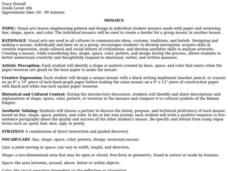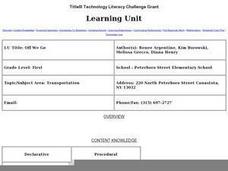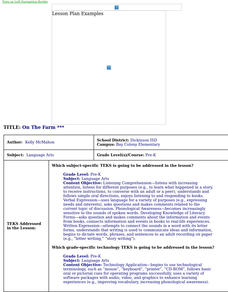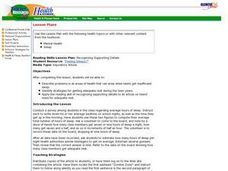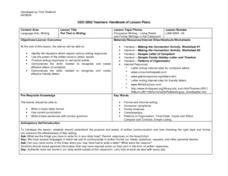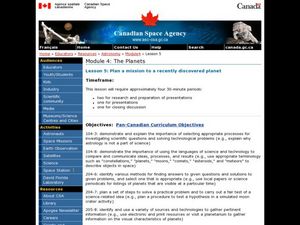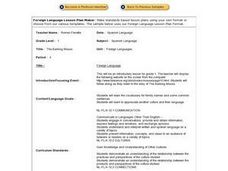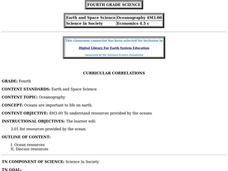Curated OER
Adjectives
Second graders identify adjectives and brainstorm adjectives that may be used to complete sentences. Students draw pictures and describe them using adjectives. The teacher and students participate in an activity where they ask...
Curated OER
Description of Materials for Parts of a Fossil Lesson Plan
Students study fossils. In this fossils lesson, students discuss and study real fossils. Students color in pictures of fossils and their sections. Students then identify fossil picture parts and names. Students write definitions for...
Curated OER
Signs of Spring
Learners identify the first signs of Spring. They track birds and butterflies on their journey North.
Curated OER
Famous People Research Project
Fourth graders research a famous person in Michigan history. They will use at least three different resources including technology to conduct their research. They then will use various forms of technology to create individual research...
Curated OER
Celebrations
Second graders answer questions after listening to the the story "Celebrating Life Around the World" and verbally identify three ways in which people celebrate special occasions. They then make two verbal connections from their own...
Curated OER
Create Your Own Sporting Event
Students use their imagination and language skills to create and describe their own sporting event. In this sporting event instructional activity, students brainstorm sports related vocabulary and identify their parts of speech. Students...
Curated OER
Mosaics
Sixth graders discuss and identify shapes, spaces, colors, patterns, or tesserae in mosaics and compare them to cultural symbols of the Roman Empire. They design and create mosaics using paper.
Curated OER
Chinese Zodiac
Fifth graders identify the basic elements of a narrative story, such as the beginning, middle, and the end; to analyze the character traits in the story to write a summary using the 5 Ws and How chart included; through sample stories...
Curated OER
Off We Go
First graders identify different types of transportation, and explain why each is important. They pretend they are going on a trip. They choose their mode of transportation, and use play money to buy their tickets.
Pennsylvania Department of Education
Analyzing Key Ideas and Details in Nonfiction
Learners explore nonfiction texts. In this language arts lesson, students read a nonfiction text and make predictions. Learners identify facts and opinions in the text and draw conclusions as they read.
Curated OER
On The Farm
Students identify animals found on farms. They create a farm picture using KidPix Software. They can combine their pictures to create a class book on farm animals. They can use graphic pictures from clipart to decorate the cover of the...
Curated OER
Geography
First graders recall names and placement of 7 continents. They recall cardinal directions. They identify and locate 3 oceans.
Curated OER
Feeling Sleepy
Students read the article "Feeling Sleepy?" students compare the article to a sleep survey they do in their class, describe problems that can arise from not getting enough sleep and identify strategies for getting adequate sleep.
Curated OER
Put That in Writing
Students identify life situations which require various writing responses, use the power of the written word to obtain results, practice writing responses to real-world events, and demonstrate the skills needed to recognize and create...
Curated OER
Writing Similes
Fifth graders identify and write similes. They define simile and discuss different examples, and with the help of a thesaurus, write original similes that compare the colors of crayons to objects or feelings. Students copy their rough...
Curated OER
Pond Habitats
Young scholars define what a pond habitat is and explain what animals live in this habitat. They discuss what can harm or destroy a pond habitat. They create a poster of what could harm a pond habitat including illustrations and...
Curated OER
Family Traditions and Special Times
Second graders recognize that families have a history through discussions with their own family members, identify traditions and how they vary in different families, and create entries in class book about traditions in their families.
Curated OER
Roots
Students are introduced to Latin and Greek roots, prefixes, and suffixes. They are given a lesson on ten root words that students identify the correct meaning of the words. Students design cards that are divided into four parts.
Curated OER
Nutritional Needs
Students determine caloric needs for an active person and what role nutrition plays in one's energy, For this nutritional needs lesson, students discuss the definition of calorie and identify high calorie foods. Students work...
Curated OER
Word Choice in Writing
Sixth graders explore language arts by writing dialogue. In this vocabulary choice lesson, 6th graders identify synonyms and the importance of using a thesaurus while writing dialogue in their own original work. Students revise and edit...
Curated OER
Plan a Mission to Recently Discovered Planet
Students plan a mission to a recently discovered planet. In this science lesson plan, students research spacecraft design, distances in space, long-term missions in space, and life-sustaining planets. Students work in groups to research...
Curated OER
The Banking Mouse
First graders learn about another culture and its language. In this Spanish lesson plan, 1st graders listen to a Cuban folktale. Students identify the Spanish words. Students reread the story independently. Students listen to...
Curated OER
Science - Magnets and Non-Magnets
In this science worksheet, students identify magnetic and non-magnetic items. They match 8 items to their definitions, and answer 6 short answer questions in which they tell what they know about magnets and the electrical method.
Curated OER
Oceanography
Fourth graders explore the importance of oceans in supporting life on earth and identify resources obtained from the ocean.






